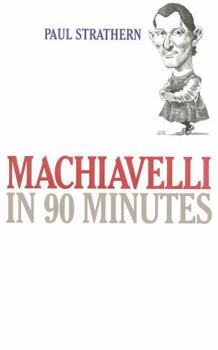Machiavelli in 90 Minutes
(Part of the Philosophers in 90 Minutes Series and Virgin Philosophers Series)
Select Format
Select Condition 
Book Overview
"Each of these little books is witty and dramatic and creates a sense of time, place, and character....I cannot think of a better way to introduce oneself and one's friends to Western civilization."--Katherine A. Powers, Boston Globe. "Well-written, clear and informed, they have a breezy wit about them....I find them hard to stop reading."--Richard Bernstein, New York Times. "Witty, illuminating, and blessedly concise."--Jim Holt, Wall...
Format:Paperback
Language:English
ISBN:1566632137
ISBN13:9781566632133
Release Date:November 1998
Publisher:Ivan R. Dee Publisher
Length:96 Pages
Weight:0.25 lbs.
Dimensions:0.3" x 5.1" x 8.0"
Customer Reviews
4 ratings
Better to be feared than loved
Published by Thriftbooks.com User , 19 years ago
As with all the works in this series this work is clearly written and provides a good outline of the life and the work. Machiavelli is seen by Strathern as a wily and subtle man of action and tells the story of his political career well. The turning point comes as it sometimes does in life with a failure. When Machiavelli loses his political position he retires to his Tuscany estate and there writes the masterpiece for which he will be infamous and famous. As Strathern understands him Machiavelli is above all a keen observer of the political world he knew who described what he saw and understood in the Italian Renaissance world of political in- fighting. 'The Prince's is the handbook which tells the Ruler how to maintain his power. And the ruthlessness, lack of Christian sentiment, required is essential to the prescription. Better to be feared than to be loved, though of course desirable to be both. The formula Machiavelli gives for ruling requires ' virtu' which Strathern perhaps incorrectly likens to Nietzsche's will-to-power. Keeping the ruler in power according to Machiavelli also requires other measures such as not relying on mercenaries, and seizing opportunities for compromise as his native Florence failed to do when it might have in doing so preserved its freedom.
A fun, interesting read.
Published by Thriftbooks.com User , 23 years ago
I'm perplexed by the people who write angrily about the "90 Minutes" series because they are disappointed not to find a serious, in depth treatment of the works of these philosophers. The books obviously don't purport to be anything but what they are: an entertaining, high level view of basic concepts and life history. The author shows in this book how Machiavelli's life and times may have affected his writings. I have other books that delve into Machiavelli's philosophy, but none of them mention his personal circumstances and history, which surely would affect his writing and philosophy. These books are good in that they put these great thinkers in a social and historical context which many books fail to do.I enjoyed the books I've read by this author a great deal.
A Decent Description of Biographical and Historical Location
Published by Thriftbooks.com User , 23 years ago
Paul Strathern does a good job of providing a very useful description of the historical and biographical context of Machiavelli's works. Without this kind of background, those who attempt to read Machiavelli's most famous work, THE PRINCE, will find their efforts to be frustrating and futile. Strathern's little book is best seen as a useful adjunct to and preparation for Machiavelli's works, not as a kind of CLIFF'S NOTES which provides a systematic delineation of his contribution to political thought (although Strathern does help the reader to understand Machiavelli's view of political theory "as a kind of science independent of morals"). Strathern offers a good contribution with his brief comparison and contrast of Machiavelli's THE PRINCE and DISCOURSES ON LIVY, alerting the reader to the more temperate and considered contribution to political theory provided by the latter work. As Strathern notes, in THE PRINCE, Machiavelli writes from the ruler's point of view, providing guidance for the ruthless consolidation of power. However, in DISCOURSES, he writes from the citizens' point of view, giving them advice on how to run things, "especially how to achieve freedom within the state." In relation to the latter, Strathern cites Machiavelli's seemingly out-of-character assertion that "people are more prudent, more stable, and have better judgment than a prince." All in all, Strathern writes clearly and engagingly, although he tends to indulge in a bit of historical gossip (e.g., his discussion of Cesare Borgia's sister, Lucrezia, daughter of Pope Alessandro VI). In sum, this book is useful as an introduction to Machiavelli's contributions, but is not an adequate substitution for a reading of Machiavelli's works.
Fun, quick, more biography than philosophy
Published by Thriftbooks.com User , 25 years ago
Even though you should be able to read it in well under 90 minutes, it does deliver what it says. More a biography of the improtant world-view shaping events in Machiavelli's life. Thin on what Machiavelli actually said and what it means. Maybe the author assumes you already knew. Nevertheless, a good read and worth the few dollars it costs.






